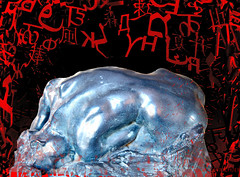-
 The Club For Growth performs its fine duty of checking up
on how well freshman GOP congresscritters are holding on
to what, arguably, got them elected: a commitment to
limited government and economic freedom.
The Club For Growth performs its fine duty of checking up
on how well freshman GOP congresscritters are holding on
to what, arguably, got them elected: a commitment to
limited government and economic freedom.
It's a mixed bag. Scores range from a pristine 100% to a dismal 37%. Spoiler for Granite Staters: NH-01's Frank Guinta got a needs-improvement 77%. Charlie Bass grabbed a near-the-bottom 48%.
-
Back
in November we heard about the plight of Joe the Puppeteer,
an Occupy Wall Street denizen. After
3 years and $35K in student loans, he got
his MFA from UConn. In puppetry. And was surprised that he was
unable to find a job that would recompense him at the
level that his newly-gathered education demanded.
But what is it with Connecticut higher ed anyway? Via Taranto, we learn of Mike Alewitz, art professor at Central Connecticut State University. He teaches "a mural class and a street art class", but The Man keeps hassling him. One of the products of his class is a 7-by 40-foot mural that "depicts students struggling under the strain of college debt as the CCSU mascot, a blue devil, looks on."
Yes, as Taranto points out: the students are irate about their eyeball-deepness in debt, due to tuition paid for a class that taught them the valuable job skill of painting a mural protesting how deep in debt they were.
Is that irony? I can never tell.
-
Wired is part of the Condé Nast publishing empire,
which is home to a lot of trendy leftism (e.g., New Yorker,
Vanity Fair). But Wired almost always plays it straight,
if somewhat befuddled, when it comes to politics.
So I was pleasantly (but only slightly) surprised by the end of Wired editor Chris Anderson's wide-ranging interview with Marc Andreessen, inventor of the modern web browser. Andreessen notes how Amazon drove Borders out of business and thereby helped build a better world. And:
Anderson: So it's creative destruction.
I think Wired just assured my subscription renewal for the foreseeable future.Andreessen: When Milton Friedman was asked about this kind of thing, he said: Human wants and needs are infinite, and so there will always be new industries, there will always be new professions. This is the great sweep of economic history. When the vast majority of the workforce was in agriculture, it was impossible to imagine what all those people would do if they didn't have agricultural jobs. Then a hundred years later the vast majority of the workforce was in industrial jobs, and we were similarly blind: It was impossible to imagine what workers would do without those jobs. Now the majority are in information jobs. If the computers get smart enough, then what? I'll tell you: The then what is whatever we invent next.
-
Ladies and gentlemen: the funniest Saturday Night Live skit
ever:
Disagree? Sorry, you're wrong.
URLs du Jour
2012-05-17
Gun, With Occasional Music
![[Amazon Link]](/ps/asin_imgs/0312858787.jpg)
Anyway: this one is a 1994 effort by Jonathan Lethem. This was his very first novel, and (to be fair) he's gone on to become a serious critically-acclaimed writer of best-selling literary fiction and some non-fiction. Lethem's Wikipedia page quotes him as getting significant literary influence from Philip K. Dick, marijuana, and punk rock. That explains a lot.
The book is set in a dystopian future where artificial evolution has granted intelligence to kangaroos, apes, sheep, etc. Drug use is universal, a snortable substance called "make" is made available for free; citizens can customize the blend of chemicals to give you the desired outcome of addictiveness, forgetfulness, etc.)
The protagonist, and first-person narrator is Conrad Metcalf, a private "inquisitor", which is what detectives are called. In a seedy world, he's unusually seedy himself. He is hired by Orton Angwine, who believes he's being framed for the murder of Dr. Maynard Stanhunt. By coincidence—or is it—Metcalf had previously been hired by Stanhunt to follow his wife around.
The book attempts a Chandleresque hard-boiled style, where Metcalfe's narrative is full of colorful observations and wisecracks. This is not easy to do right, and… well, I'd rather have re-read Chandler for the fourth or fifth time, instead. This doesn't even read like a good Chandler parody; it's more like a parody of a bad Chandler parody.
Most of all, the book never provided me with a satisfactory answer to the question: Why should I care?
![[The Blogger and His Dog]](/ps/images/me_with_barney.jpg)



